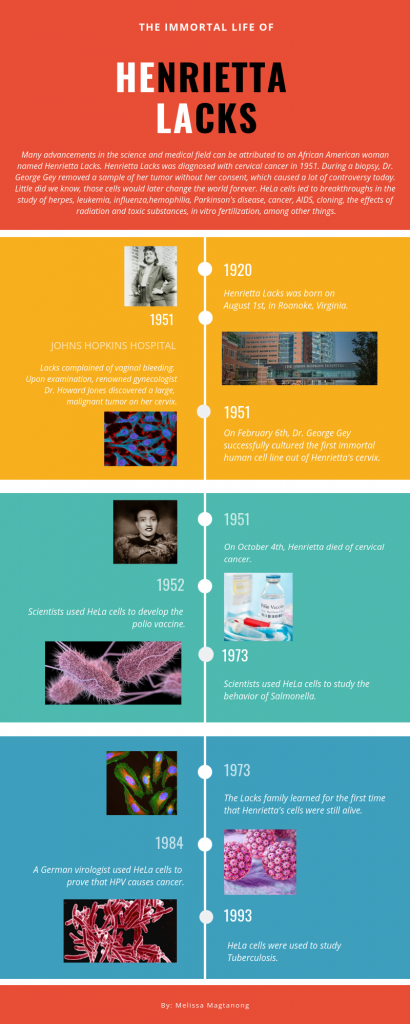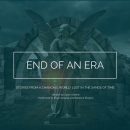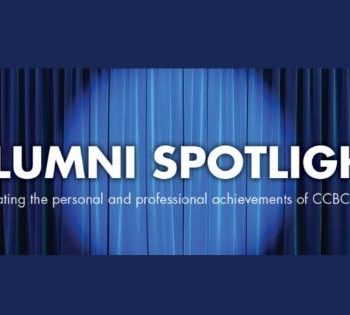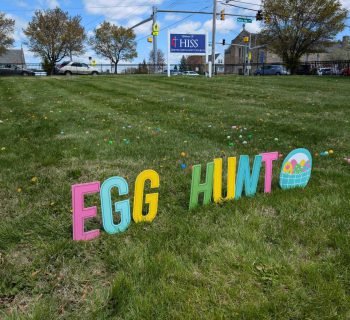Niya Richardson
For ages scientists were looking for cells that had the ability to grow outside of the human body. Imagine having that cell and being responsible for keeping millions of people alive today but never being asked for permission or compensated for doing so.
Henrietta Lacks was an African-American woman and mother of 5 who died at the age of 36 from cervical cancer on October 4, 1951. Her unique and resilient cancer cells were the first to grow in a lab outside of a human body. Her cells are the source of the first immortalized cell line in history and one of the most important cell lines in medical research.
Her cells received the name the “HeLa Cell” from doctors of Johns Hopkins Medical Center because those doctors used her cells for their research but did not ask for permission or give her credit. Her family was never fully compensated.
HeLa Cells were used to help test the polio vaccine, develop in-vitro fertilization, and to help develop drugs and methods to help fight cancer. HeLa Cells were reproduced in the millions around the world and have helped make millions of dollars.
The Henrietta Lacks Memorial Lecture is an attempt by Johns Hopkins Medical Center to amend these controversial issues. Hopkins has held the lecture annually at the Turner Auditorium on their Medical Campus since 2009 and it is free to the public.
Angelita Thomas-Crawford, a college professor says she likes to attend every year with her sons, “to keep up with the status of the Lacks family and know what is going on with the research in the medical field with the HeLa Cell.” She also said, “I like to see what speakers attend every year and what scholarships and awards are given out.”
Nurse, Michelle Whitfield, who attends the memorial lecture every year says she finds Lacks’ story, “compelling and inspiring.”
The annual sold out event started at 8a.m. and began with registration and check-in followed by breakfast. The attendants of the lecture this year were given free bags and shirts. The lecture began at 9 a.m.
The Great Granddaughter of Lacks, Aiyana Rogers started off the Lecture by giving some brief background about her great-grandmother. This was followed by a Greeting from Dr. Daniel E. Ford, Vice Dean and Professor of Medicine at Johns Hopkins Institute for Clinical and Translational Research, and a welcome from Dr. Jeffrey Kahn, Director of Johns Hopkins Berman Institute for Bioethics.
Then there were PowerPoint presentations paying homage to Dr. William C. Wade Sr. celebrating what he has done for African Americans in the community of Baltimore, as well as, what he has done for Lacks. Without Dr. William C. Wade Sr.’s referral of Lacks to Johns Hopkins, there might have never been a HeLa Cell found.
The rest of the lecture talked about Health Equity and social justice in Baltimore followed by a panel discussion with all of the speakers. Speaker Dr. Lisa Copper said, “It’s important to have meetings between the community and doctors to gain trust and better communication and to identify what needs need to be met by them in the community.”
The lecture concluded with awards given out and a lunch for all attendees. Many in attendance seem to share the belief that it is important to hold the lecture annually to celebrate Henrietta Lacks and what she did for the medical community, as well as to address the injustice people in certain communities may face because of various disadvantages in life.
The general theme of the event seemed to be, “never forget the patient behind the petri dish!”
*Articles reflect the views of the author and or those quoted and do not necessarily represent the views of CCBC or the CCBC Connection.
















Henrietta Lacks is being celebrated by the public. This woman’s cells lived outside of her body. Her great-granddaughter did a speech about her at a meeting. This event was to address the lack of justice that many people in disadvantage communities face. She died of cervical cancer at an early age and was the first person know to have her cells live outside of her body. Her family has not been compensated for her cells.
I have read about Henrietta Lacks before and this is another writing informing the public about her story. I did not know she had a great-granddaughter. The story of Lacks is interesting and it shows how poor people and people of color can be unjustly treated in our society. I am glad the CCBC news paper did this article, Lacks is a native Baltimorean and this is a local focus.
Publication (CCBC Connection)
Article (Henrietta Lacks 2017 Memorial Lecture)